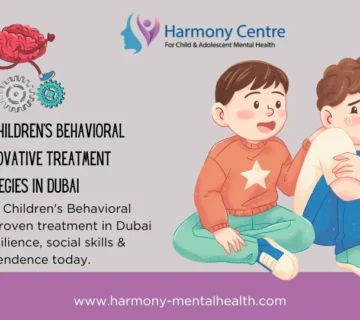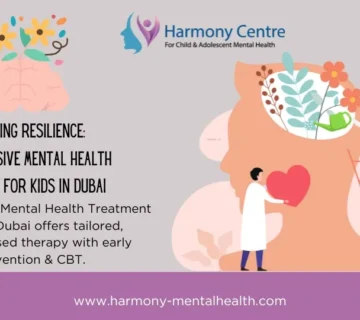Apraxia Symptoms Dubai: Recognizing and Addressing Speech Coordination Challenges at Harmony Centre
Discover key apraxia symptoms in children and learn effective interventions in Dubai at Harmony Centre. Our expert team offers evidence‑based strategies to improve speech coordination.
Contact Information
| Contact Method | Details |
|---|---|
| Phone | +971 (52) 8773268 / 04 558 2015 |
| Click Here | |
| info@harmony-mentalhealth.com | |
| Address | Office 409, Building Alrazi-64C, 26th St, Healthcare City, Dubai |
Introduction
In a diverse and rapidly evolving city like Dubai, effective communication is essential for success in all aspects of life. However, some children struggle with speech coordination due to apraxia—a motor speech disorder that affects the ability to plan and execute the movements required for speech. At Harmony Centre Mental Health Dubai, we understand that early identification and intervention are crucial for overcoming apraxia. Our multidisciplinary team uses evidence‑based strategies to assess and treat apraxia symptoms, helping children improve their speech clarity and confidence.
Learn More About Harmony Centre • Contact Us
Understanding Apraxia
What Is Apraxia?
Apraxia of speech is a motor planning disorder in which the brain has difficulty coordinating the muscle movements needed for clear speech. Unlike articulation disorders, apraxia is not due to muscle weakness but rather a disconnect in the brain’s ability to plan the precise movements required to speak. This condition can affect children of all ages and may lead to inconsistent speech errors and difficulties with verbal communication.
Key Characteristics of Apraxia
- Inconsistent Errors:
Children may sometimes pronounce words correctly and other times incorrectly. - Difficulty with Complex Sounds:
Complex or multisyllabic words are often challenging. - Groping for Sounds:
Children might exhibit visible effort or struggle when trying to form words. - Slowed Speech:
The overall pace of speech can be slower as the child tries to plan each sound. - Frustration and Avoidance:
Speech difficulties can lead to frustration, social withdrawal, and reduced self‑confidence.
Recognizing the Signs and Symptoms
Early Indicators of Apraxia
Early detection of apraxia is essential to provide timely intervention. Parents, caregivers, and educators should be alert to the following signs:
Speech Inconsistencies
- Variable Pronunciation:
A child may articulate a word correctly in one instance but mispronounce it in another. - Difficulty Repeating Phrases:
Repetition tasks might reveal inconsistent production of sounds. - Slower Speech Rate:
The child’s speech may be notably slower compared to peers.
Motor Planning Challenges
- Groping Movements:
Observing the child’s mouth and facial muscles, you might notice visible attempts to form words. - Frustration During Communication:
The child might appear visibly frustrated when trying to speak, avoiding communication when possible.
Impact on Social and Educational Settings
- Limited Participation:
Due to difficulties with clear communication, the child might be reluctant to participate in group discussions or classroom activities. - Behavioral Changes:
Frustration with speech difficulties can lead to behavioral challenges and decreased self‑esteem.
Recognizing these signs early allows for intervention strategies that can significantly improve long‑term outcomes.
Causes and Diagnosis of Apraxia
Causes of Apraxia
The exact cause of apraxia of speech is not fully understood, but several factors may contribute:
- Neurological Factors:
Disruptions in the brain’s motor planning areas can impair the ability to coordinate speech movements. - Genetic Influences:
A family history of speech disorders may increase the likelihood of apraxia. - Developmental Issues:
Apraxia can occur as part of broader developmental delays, affecting multiple areas of growth.
Diagnostic Process
Comprehensive Assessment
At Harmony Centre, our diagnostic process for apraxia involves a detailed evaluation that includes:
- Standardized Speech Assessments:
We use validated tools to measure speech production, consistency, and rate. - Direct Observations:
Clinicians observe the child during structured tasks and natural interactions to identify patterns and inconsistencies. - Parental and Educator Feedback:
Input from parents and teachers is collected through questionnaires and interviews to provide a complete picture of the child’s speech abilities. - Multidisciplinary Review:
Our team of speech therapists, child psychologists, and occupational therapists collaborates to create a comprehensive diagnostic profile.
This thorough evaluation forms the basis for developing a personalized treatment plan tailored to the child’s specific needs.
Learn More About Our Diagnostic Services
Contact Harmony Centre
Treatment Strategies at Harmony Centre
Personalized Therapy for Apraxia
At Harmony Centre, we combine evidence‑based practices with a multidisciplinary approach to design treatment plans that target the unique challenges of apraxia.
Individual Speech Therapy
- Focused Interventions:
One‑on‑one sessions focus on repetitive practice of target sounds, using techniques like motor planning and phonetic placement therapy. - Discrete Trial Training:
Tasks are broken down into small, manageable steps, with immediate feedback to reinforce correct sound production. - Use of Visual and Tactile Cues:
Therapists employ visual aids, mirrors, and tactile cues to help the child understand the correct placement of articulators.
Group Therapy Sessions
- Peer Interaction:
Group sessions provide opportunities for children to practice communication in a supportive environment. - Social Skills Training:
Collaborative activities encourage the development of interpersonal skills and build confidence in speaking with peers. - Motivational Reinforcement:
Positive feedback from both therapists and peers helps boost self‑esteem and encourages continued practice.
Family Involvement
- Parental Workshops:
We offer training for parents to learn effective strategies to reinforce speech therapy techniques at home. - Home Practice Programs:
Tailored exercises are provided to ensure that the child can continue practicing between sessions. - Consistent Communication:
Regular updates and feedback sessions with parents help adjust therapy strategies and ensure a cohesive approach.
Evidence-Based Outcomes and Success Stories
Measurable Improvements
Our targeted interventions have shown significant, measurable improvements in children with apraxia:
- Enhanced Speech Consistency:
Many children demonstrate more consistent production of words over time. - Improved Articulation:
Regular therapy leads to clearer speech, with reduced mispronunciations. - Increased Participation:
As communication improves, children become more confident in social and academic settings.
Real-Life Transformations
Real-life testimonials underscore the effectiveness of our approach:
“After starting speech therapy at Harmony Centre, my son’s speech has become much clearer. His confidence has grown, and he now participates more actively in class.”
– Parent Testimonial
“The integrated therapy approach at Harmony Centre made a significant difference in my daughter’s ability to communicate. The progress we’ve seen is truly remarkable.”
– Parent Testimonial
For further reading on apraxia and speech therapy, visit the American Speech-Language-Hearing Association (external link).
Practical Strategies for Enhancing Speech at Home and School
For Families
Establish a Supportive Environment
- Designate a Practice Space:
Create a quiet, well‑lit area at home dedicated to speech practice. - Use Visual Aids:
Tools like mirrors and picture cards help your child understand proper mouth movements. - Set Regular Practice Times:
Consistent daily practice sessions, even if short, reinforce therapy techniques.
Encourage Open Communication
- Active Listening:
Engage in conversations where you actively listen and provide positive feedback. - Role‑Playing:
Practice everyday scenarios through role‑playing to build confidence and fluency. - Celebrate Successes:
Praise small improvements to boost your child’s self‑esteem and encourage persistence.
For Educators
Integrate Speech Support in the Classroom
- Incorporate Speech Activities:
Use interactive games and group activities that promote clear articulation and verbal expression. - Collaborate with Therapists:
Work with speech therapists to integrate targeted exercises into classroom routines. - Provide a Positive Environment:
Encourage a supportive atmosphere where students feel comfortable practicing their communication skills.
Foster Peer Support
- Group Projects:
Organize collaborative projects that require clear communication and teamwork. - Feedback Sessions:
Create opportunities for peer feedback, helping students learn from one another in a constructive way.
For the Community
Engage in Speech Therapy Workshops
- Parent Support Groups:
Join workshops where parents can learn effective strategies and share experiences. - Community Seminars:
Attend local seminars focused on speech development and effective communication strategies. - Digital Resources:
Utilize telehealth services and educational apps to supplement in‑person therapy and maintain continuous support.
Explore Our Community Initiatives
Contact Harmony Centre
Frequently Asked Questions about Apraxia Symptoms Dubai
Book a Consultation Now
Contact Information
Office Address:
Office 409, Building Alrazi-64C, 26th St, Umm Hurair 2, Dubai Healthcare City, Dubai
Phone:
+971 4 558 2015
+971 5 287 73268
Email:
info@harmony-mentalhealth.com
Final Thoughts about Apraxia Symptoms Dubai
Early recognition and intervention for apraxia of speech are essential for helping children achieve clearer communication and greater self‑confidence. At Harmony Centre Mental Health Dubai, our evidence‑based, multidisciplinary approach provides personalized care that addresses the unique challenges of apraxia. Through integrated therapy, continuous monitoring, and active family involvement, we empower children to overcome speech coordination challenges and thrive in both academic and social settings.
Invest in your child’s future with expert apraxia therapy at Harmony Centre. Our commitment to excellence, cultural sensitivity, and ongoing support makes us a trusted partner in transforming speech and communication skills for lasting success.
Learn More About Harmony Centre
Get in Touch
👉 Book a Consultation Now: Call +971 4 558 2015 or visit www.harmony-mentalhealth.com.
Join our online community and stay updated with our latest events, articles about Apraxia Symptoms Dubai



